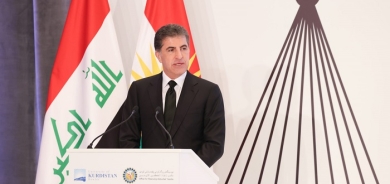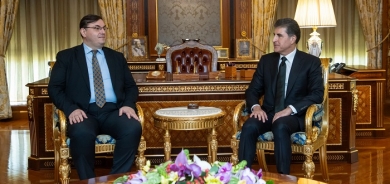Syria Opposition Groups Set Framework for Proposed Talks

A powerful Syrian insurgent faction pulled out of an opposition conference on Thursday in protest over the role given to groups it said are close to the Syrian government, signaling continued divisions among rival factions ahead of proposed peace negotiations with President Bashar Assad's government.
Ahrar al-Sham, a Saudi-backed ultraconservative group that operates mainly in northern Syria, said in a statement that it was withdrawing also because the conference failed to "confirm the Muslim identity of our people."
The group's withdrawal came at the end of the two-day conference in the Saudi Arabian capital, Riyadh, which sought to form a unified opposition front ahead of the proposed talks for ending Syria's nearly five-year conflict.
Two opposition members said participants at the meeting agreed on a framework that would guide the proposed talks. They established a "supreme council" made up of 32 opposition members and representatives of rebel factions that would later pick the 15 people who would negotiate on behalf of the opposition.
A senior member of the Syrian National Coalition, a Western-backed opposition group, told AP that most participants agreed on its vision for a civil, democratic Syria and a transitional government that would respect human rights and the territorial integrity of Syria. Participants also agreed on the need to safeguard state institutions while restructuring the security forces.
Although Western leaders have recently said Assad can stay on as part of a transition for an unspecified time, SNC and other participants at the Riyadh meeting insisted he cannot be part of a transitional government.
U.S. Secretary of State John Kerry welcomed the "positive outcome" of the gathering in Riyadh where an "extremely diverse group of Syrians put aside differences in the interest of building a new Syria."
"While this important step forward brings us closer to starting negotiations between the Syrian parties, we recognize the difficult work ahead," he added.
The stakes were high for the Riyadh meeting, during which the disparate and often competing opposition factions were held to a tight deadline to agree on the outlines of a political solution to the crisis and choose representatives for the talks.
Security was exceptionally tight at the hotel venue in the Saudi capital Thursday. The entrance was blocked by armored vehicles and watched by snipers. Security guards and police kept visitors out of the hotel.
Kerry, in separate statements earlier, told reporters that he had spoken to Saudi Foreign Minister Adel al-Jubeir and Russian Foreign Minister Sergey Lavrov to organize the next Syria meeting, tentatively set for Dec. 18 at the United Nations headquarters in New York. A peace plan agreed to last month by world powers meeting in Vienna set a Jan. 1 deadline for the start of talks between Assad's government and opposition groups.
Although there was agreement on a framework for negotiation, the withdrawal of Ahrar al-Sham, whose founders are linked to al-Qaida, underscored the difficulties that lie ahead as groups with competing ideologies try to forge a common vision for the future.
Divisions remain over whether Assad could be part of a political transition although most participants agree he should step down at the start of the transitional period, said Omar Mushaweh, a senior Muslim Brotherhood member whose party is represented at the meeting.
"The outcome is somewhat positive ... but it is fragile and the process can collapse at any time," he told The Associated Press.
Saudi Arabia has been a key backer of Sunni opposition blocs pushing for Assad's ouster, such as the hard-line Jaysh al-Islam and Ahrar al-Sham groups that were at the talks. Also in attendance were representatives of the Syria-based National Coordination Body, an organization sometimes accused by other opposition members of being too conciliatory toward Assad's government although several of its senior members are in prison.
Ahrar al-Sham said it faced "a religious and national duty to withdraw from the conference to protest its outcome." Among the reasons it listed in its statement: "Giving a principle role for the National Coordination Body and other personalities loyal to the regime in clear violation of revolutionary work."
Speaking at a news conference earlier on Thursday, Al-Jubeir said Assad has two choices, "either to leave through negotiations" or be forcibly removed from power.
The comments drew a sharp response from Syria's Information Minister Omran al-Zoubi in Damascus, who called al-Jubeir's statements a "farce."
"You are too insignificant to talk about matters related to the Syrian people and Syrian state, I advise you to take care of issues your own size," he added.
———
Karam reported from Beirut. Associated Press writer Bradley Klapper in Washington contributed to this report.















